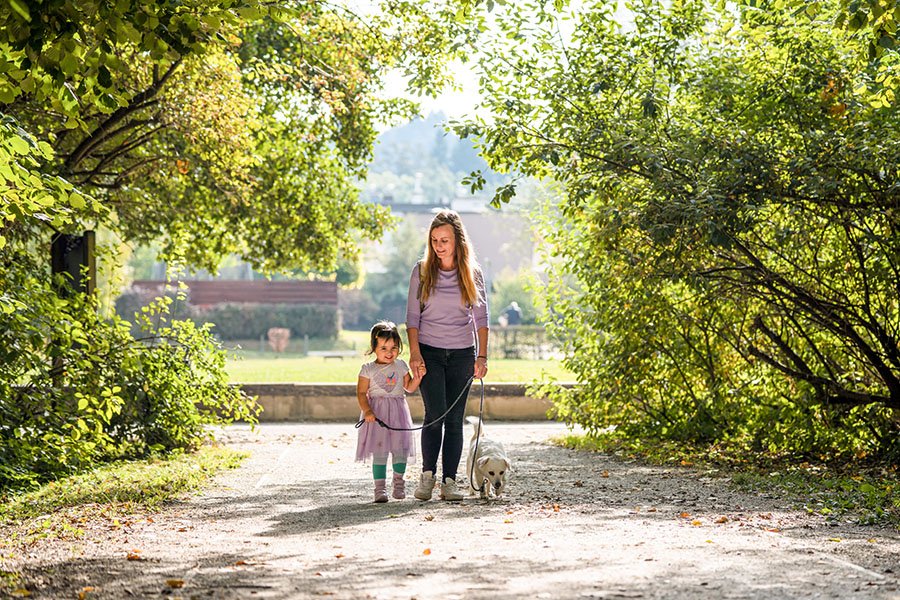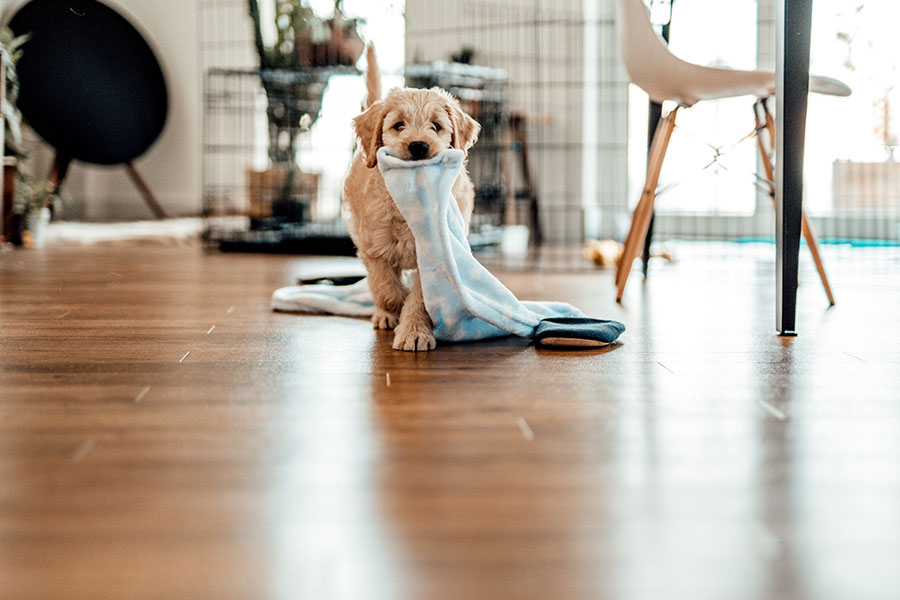10 Considerations for Pet Parents When Shopping for a Home
An agent explains what buyers with dogs or cats are looking for (and what they aren’t).


Written by May Ortega on August 1, 2025
Some people choose a home because it's adjacent to a hopping entertainment district or close to their job. But those of us with dogs, cats, and other animals that are like our children, we pick homes that will make our pets happy. A 2024 Zillow survey found that 76% of home buyers have at least one pet, so you're far from alone in wanting to choose the right home for you and your best buddy. Here are 10 pet-approved tips for finding a home:
1. Look for a property with a fenced-in yard
Our research found that dogs are the most commonly owned pet among buyer at 64%. And the holy grail for dog parents is a bucolic, grassy yard where your pet can play behind a secure fence.
Look for a physical fence, not an invisible one, says Nicole Prince, an agent with the Figueroa Team in Orlando. She says invisible fences (also called e-fences) have fallen out of favor.
“None of my buyers with dogs want to put a shock collar on their dog," Prince says. “They want to buy a house with an actual fence."
Cats are the second-most-commonly owned pet (42%), and if yours is the type who likes to spend time outdoors, a physical fence can let them get some fresh air while you have peace of mind that they're in a safe place.
The next best thing to a fully fenced yard is a partially fenced one, Prince says. You can always expand the fence to give your fur kid a safe outdoor place to play.
2. Make sure any pools are pet safe
A pet-safe pool has a fence that separates the pool from the rest of the yard. A pool fence is a safety feature that helps prevent kids and pets from falling into the pool while unsupervised. Many places require fences around pools, but not all do. Even if your pet can swim, a fall into the pool while you are not home could be life-threatening or even fatal.
Sure, a Lab isn't a drowning risk, but not all dogs can swim. Some breeds, like Basset Hounds, Pugs, or Dachshunds, are not physically built to dog paddle. They have short legs, barrel-shaped bodies, or flat faces that make swimming and breathing tough. The Pool Safety Network says thousands of dogs die in pools in their yard each year.
Cats can swim, but if they don't have an easy way to get out of your pool, or it requires a lot of paddling to escape, they may get too tired to make it. So it's better to put safety first regardless of who you have at home.
3. Pick a neighborhood with pet-friendly amenities
Look for a dog park within walking distance and restaurants and cafes that welcome dogs on their patio. Sidewalks, greenways, pet-friendly city parks, and pet watering stations are nice features, too. Look for an area with services your pet will need, as well, like a good vet.
“I've had clients ask me if I knew a dog walker and if there was a doggy daycare near a house," Prince says.
She's also helped dog-owning home buyers find properties close to a highly rated veterinarian or dog groomer.

4. Beware of stairs
Cats and some dogs can usually navigate stairs pretty well, but older pets or short-legged breeds don't necessarily love stairs. Whether you're looking at a two-story home with one flight of stairs, or a condo that can only be accessed by several flights, those steps can be a barrier.
“Stairs can be a real obstacle, especially if you have a short or an old pet," Prince says.
Stairs could limit your fur baby's mobility within your house. Prince recommends looking for single-story houses on a slab or condos with elevators your pet can ride in.
5. Find a place with a bedroom on the first floor
Beware of stairs, part two. If you let your kitty or your puppy sleep in bed with you, and your bedroom is up a flight of stairs, and your pet is old or short-legged, you may not be able to get them to bed. Prince recommends you look for a house with a bedroom on the main floor.
"Even if your dog is young and has no problems scaling the stairs now, the time will come when he'll struggle with them," Prince says.
She advises choosing a house that will let your pet age in place. If you own a Basset Hound or Corgi, or a Munchkin cat, they will thank you for removing the stairs between them and your cozy bed.
6. Choose a home without carpet
Accidents happen, even with house-trained pets. Floors with a hard, impermeable surface are your friend for this reason. And here's a pro tip from Prince:
“Carpets soak up stains, so they're a big no-no," Prince says. “If you can get floors that match the color of your pet's fur, you can camouflage the hair they shed. I have brown laminate floors that are the same color as my dog's fur. It's my alternative to running a Roomba 24/7."
She advises homebuyers with pets look for hardwood, tile, or laminate floors. If you have a cat, hard floors also make it easier to clean up any litter they may track after they visit the litter box.

7. Choose a larger space
Pets need room to roam inside, so you might feel crowded if you and your pups and kitties are stuffed into a 1,000-square-foot house. Prince says her buyers with pets are generally looking for larger homes.
“Most of them want at least three bedrooms because they usually have several pets," she says.
Zillow data shows that home buyers today are more likely to have a furry child than a hairless, human one — 76% have at least one pet, while 43% have a kid. And separate data from 2021 indicates that buyers with pets were nearly twice as likely as buyers without pets to buy homes larger than 3,000 square feet.
Pro tip: Zillow lets you filter for homes according to their square footage.
8. Find a home with plenty of windows
When searching for a house with your pet in mind, consider the importance of natural light and window access. Cats and dogs love basking in sunbeams and watching the world go by through large windows with low sills. Features like bay windows and window seats can become perfect perches for your furry friends, making your home a cozy haven for both of you.
9. Make sure the home isn't near dangerous wildlife
Depending on where you live, you may need to avoid properties adjacent to wilderness areas inhabited by wild animals that could harm your pet.
In the Southwest, this means staying away from desert expanses where there's the risk that rattlesnakes bite your dog, or a coyote gets to your cat (or small dog). Home shopping in the Southeast or Pacific Northwest? This may mean staying away from homes by forests where birds of prey could snatch a small dog or cat out of the yard. In Florida, where Prince sells homes, this means avoiding homes on lakes and ponds where alligators lurk.
“A lot of my buyers don't want a home near a body of fresh water," Prince says. “The odds of your dog or cat getting taken by a gator are slim, but it happens here."
Your best bet is a dense, urban neighborhood that doesn't back up to an area where the wild things are.
10. Beware of properties subject to breed or weight restrictions
Some HOAs, neighborhood covenants, or co-op boards restrict the type, number, and size of animals they allow. Before you buy, make sure the property you're interested in isn't subject to rules that will limit what pets you can have, or that would need you to re-home your perfect pet.
Prince says she's seen neighborhood associations and property management boards that forbid homeowners to have so-called “dangerous breeds” like Pitbulls, German Shepherds, Malamutes, Chow Chows, and Mastiffs. She's also encountered property management associations in townhome or condo communities that have weight limits for pets or limit homeowners to two dogs. If you plan to increase the pets in your family, steer clear of properties that may keep you from adding to your pack.
If you're nearing the end of a rental lease and you may need to find a new apartment while you're home shopping, we have advice on how to find a rental when you have a large dog. And when you're ready to buy, you can find a great agent on Zillow.
Pro tip: Let your agent know about your pets right away. Share any concerns you have so that your agent can apply them to your home search.
A local agent can help you stay competitive on a budget.
They’ll help you get an edge without stretching your finances.
Talk with a local agent


